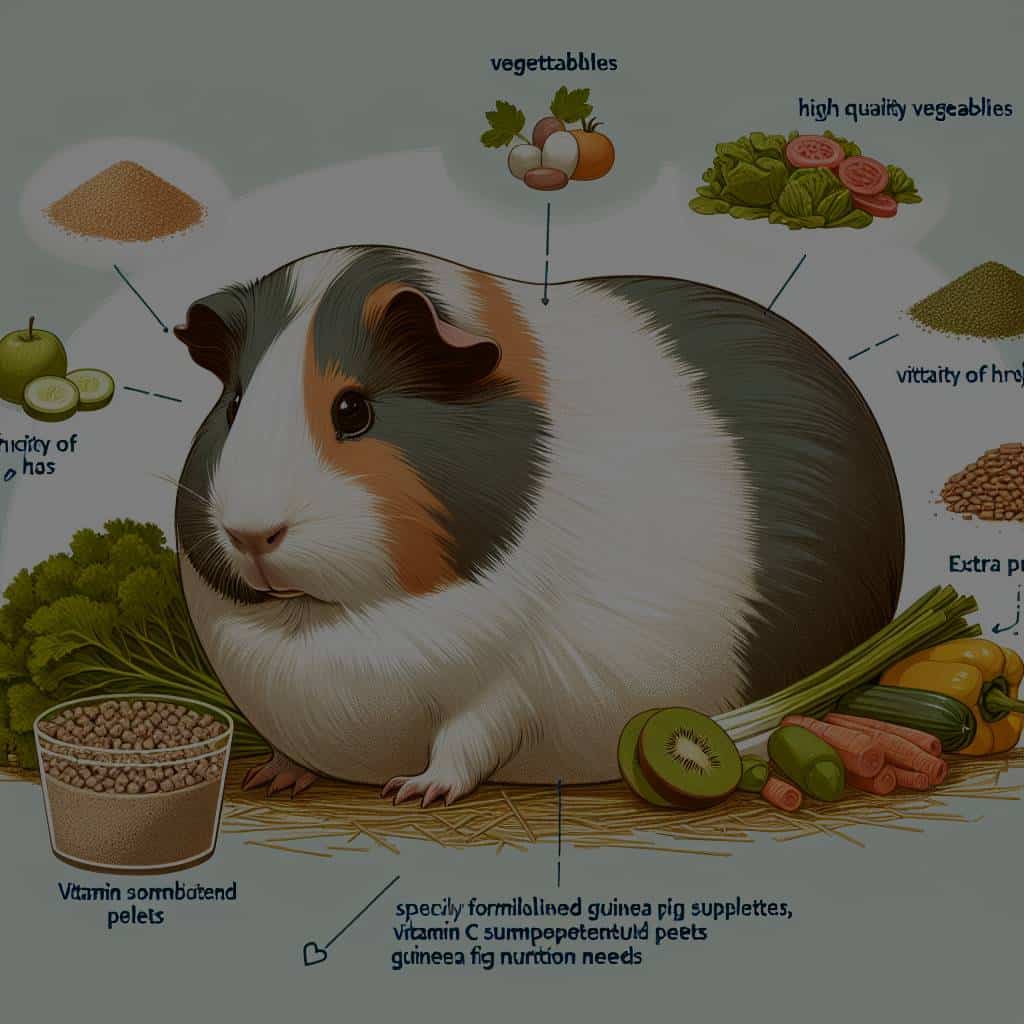What Are the Nutritional Needs of a Pregnant Guinea Pig?

Pregnant guinea pigs have unique nutritional requirements that differ from those of regular adult guinea pigs. Ensuring that these specific nutritional needs are met is crucial to the healthy development of their babies, and their own overall health. In this article, we will delve into the nutritional necessities of a pregnant guinea pig, providing a comprehensive guide to help you nurture your guinea pig effectively during its pregnancy.
Understanding the Basics of Guinea Pig Nutrition
Before we dive into the specific nutritional needs of pregnant guinea pigs, it’s important to understand the basics of guinea pig nutrition. These basics form the foundation upon which the diet of a pregnant guinea pig is built.
Also read : What’s the Best Method to Keep a Dog Calm During Grooming Sessions?
Guinea pigs, pregnant or not, are herbivores. This means they eat plants and plant-based foods. Their diet should consist of a balance of hay, fresh vegetables, fruits, and high-quality guinea pig pellets.
Hay, particularly Timothy hay, should make up the majority of a guinea pig’s diet. Hay is not only a source of necessary fiber but it also helps in maintaining good dental health. Guinea pigs have continuously growing teeth, and chewing on hay helps to prevent overgrowth.
Additional reading : How to Help a Shy Dog Build Confidence Through Interactive Games?
Fresh vegetables and fruits provide necessary vitamins and minerals. However, be mindful of the portions as too much can lead to digestive issues and obesity.
Guinea pig pellets should be fortified with vitamin C, a vital nutrient guinea pigs can’t produce themselves. Lastly, a constant supply of fresh, clean water is non-negotiable.
The Nutritional Needs of Pregnant Guinea Pigs
Pregnant guinea pigs have specific dietary requirements that need to be met to ensure their health and the health of their developing babies. Here is what you need to know when catering to these needs.
Pregnant guinea pigs require a higher intake of protein to support the growth of their babies. The protein content in their diet should be increased to about 18-20%. This can be achieved by slightly increasing the amount of guinea pig pellets, which are high in protein, and including high-protein vegetables like peas and corn in their diet.
They also require more calcium for the development of the babies’ bones and teeth. Pregnant guinea pigs should consume about 0.5-1% of calcium in their diet. Dark green leafy vegetables and high-quality guinea pig pellets generally contain enough calcium to meet this requirement.
Vitamin C is crucial for pregnant guinea pigs. A lack of vitamin C can lead to scurvy, a disease that can cause complications during pregnancy. It is recommended to provide about 30-50 mg of vitamin C daily, which can be obtained through vitamin-C-rich foods like bell peppers, strawberries, and guinea pig pellets.
Feeding Tips for Pregnant Guinea Pigs
When feeding your pregnant guinea pig, there are a few things you should keep in mind. These tips will ensure that your guinea pig gets the right nutrients in the right amounts.
First, it’s important to provide a variety of foods to ensure a balance of nutrients. Just like humans, guinea pigs can get bored with the same food every day. Adding variety also ensures they are getting a range of different nutrients.
Keep an eye on the portion sizes. While pregnant guinea pigs require more food, overfeeding can lead to obesity, which can complicate pregnancy and birth. As a rule, a pregnant guinea pig’s diet should consist of unlimited hay, a cup of fresh vegetables per day, a small amount of fruit, and an increased amount of guinea pig pellets.
Finally, keep the food fresh. Spoiled food is bad for the health of both the mother and the unborn babies.
Potential Health Problems Associated with Poor Nutrition
Poor nutrition during pregnancy can lead to various health problems for both the mother guinea pig and her babies. Understanding these potential health problems can help underscore the importance of proper nutrition.
The most common problem associated with poor nutrition is pregnancy toxemia. This is a metabolic disorder that can occur in the last stages of pregnancy or shortly after birth. It is often related to malnutrition, obesity, or a lack of exercise.
Nutritional deficiencies, particularly of protein, calcium, or vitamin C, can also lead to various health problems. A lack of protein can result in weak babies, while a calcium deficiency can lead to soft bones and teeth. Insufficient vitamin C can lead to scurvy, which causes weakness, joint pain, and potentially, complications during birth.
To avoid these health issues, it is vital to provide your pregnant guinea pig with a well-balanced diet that meets her nutritional needs.
Monitoring Your Guinea Pig’s Health During Pregnancy
Keeping an eye on your pregnant guinea pig’s health is as important as providing her with the right nutrition. Pregnancy can be a challenging time for your guinea pig, and her health could change rapidly during this period.
Weight gain is normal during pregnancy, but excessive weight gain could be a sign of overfeeding or health complications such as gestational diabetes or obesity. Regularly weigh your pregnant guinea pig to ensure she is gaining weight at a healthy rate.
Guinea pigs usually have a good appetite, but a pregnant guinea pig might eat more than usual. However, if she stops eating or starts losing weight, it might be a sign of an underlying health issue, such as pregnancy toxemia, and you should consult a vet immediately.
Look out for changes in behavior. If your normally active guinea pig becomes lethargic, or if she is drinking excessively, it could be a sign of a health issue. These changes can also be associated with malnutrition or dehydration.
Examine your guinea pig’s teeth and gums regularly. As mentioned earlier, a lack of vitamin C can lead to scurvy, which can cause gum bleeding and tooth loss. Regular checks can help you spot these symptoms early on.
Lastly, always keep an eye on the condition of your guinea pig’s stool, as changes in its consistency can indicate digestive issues, often linked to improper nutrition.
Conclusion
Caring for a pregnant guinea pig can be both rewarding and challenging. It requires dedication, attention, and an understanding of their unique nutritional needs. By ensuring they consume a well-balanced diet rich in proteins, calcium, and vitamin C, you can significantly enhance their health and the health of their babies.
Remember, every guinea pig is unique and may have different dietary preferences and health conditions. Always monitor your guinea pig’s behaviour, weight changes, teeth, and stool regularly. Any drastic changes should be addressed with a vet immediately.
Moreover, the significance of providing fresh food and clean water cannot be overstressed. Spoiled food or contaminated water can lead to serious health issues, potentially risking the lives of the mother and her babies.
In conclusion, the nutritional needs of a pregnant guinea pig are not vastly different from a non-pregnant one, but the quantities and balance of nutrients do change. By following the guidance provided in this article, you can ensure that your pregnant guinea pig leads a healthy, happy life throughout her pregnancy, and gives birth to healthy babies.
